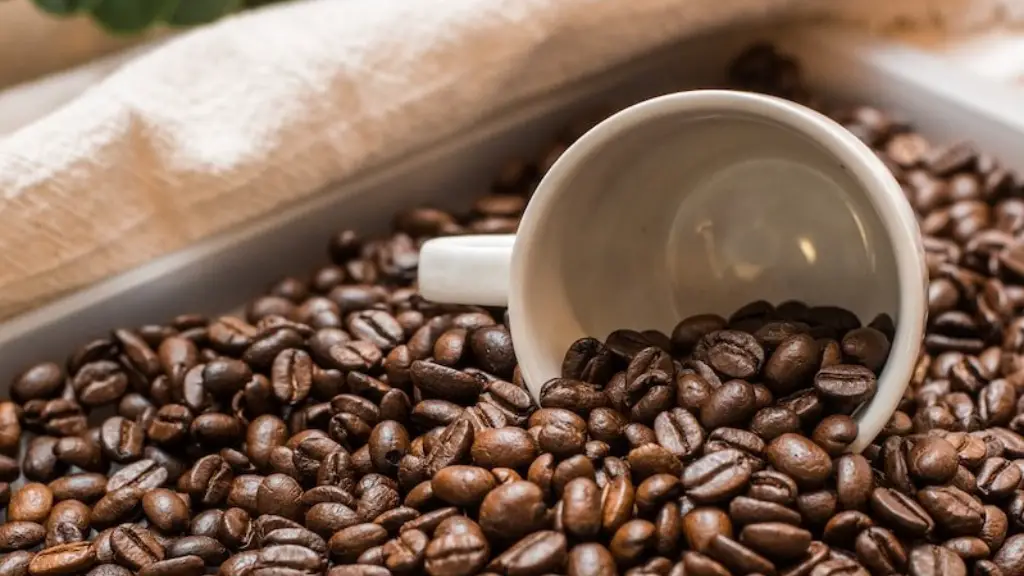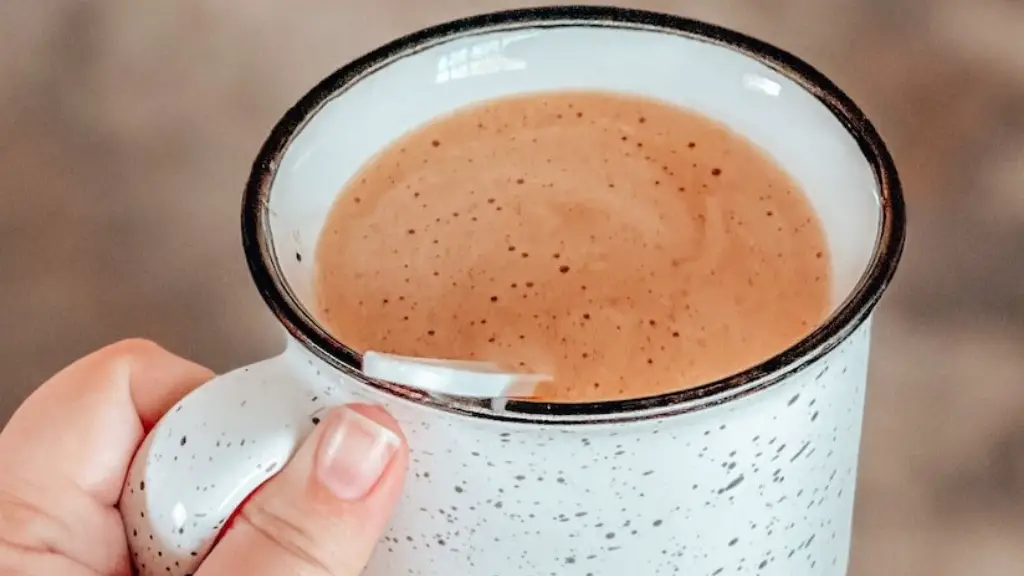Do you ever feel like your heart is racing after drinking a cup of coffee? If so, you’re not alone. Thousands of people experience a similar physical reaction when they consume coffee, an experience that can be uncomfortable, alarming, and even frightening. Knowing why this occurs can help make it less of a bother.
Most research studies point to the fact that caffeine is the main factor in causing this reaction. Caffeine is a stimulant, its intake can cause an increase in your breathing rate, heart rate, and blood pressure. Even if you feel like your coffee isn’t very strong, it can still contribute to the “heart racing” effect. Furthermore, coffee contains naturally occurring substances such as theobromine and theophylline, which are both stimulants, which can contribute to this feeling.
Experts say that the effects of caffeine can be felt as soon as 30 minutes after drinking coffee and can last for as long as 6 hours. The overall effect of the coffee on a person’s heart rate will vary from person to person, depending on several factors. Age, weight, and height can all play a role in how a person’s body reacts to the stimulants in coffee. It is also important to consider the strength of the coffee, as well as how many cups of coffee a person is drinking.
To minimize the possibility of feeling your heart race after drinking coffee, it is important to keep track of how much caffeine you’re consuming, and to avoid drinking more than the recommended amount. The American Heart Association suggests that, to maintain proper health, adults should limit their caffeine intake to no more than 400 milligrams per day. It is also important to be aware of other sources of caffeine, such as soda, tea, and energy drinks, which can also cause your heart rate to increase.
If you’re looking for a way to still enjoy coffee without the accompanying palpitations, decaffeinated coffee is one approach. Studies have shown that decaffeinated coffee can provide the same flavor, aroma, and texture as regular coffee, but without the resulting physical effects, such as an elevated heart rate.
All in all, it is important to remember that if you’re feeling your heart racing after drinking coffee, it is nothing to be alarmed of. While the experience can be scary or uncomfortable, it isn’t necessarily dangerous. It is, however, important to monitor your caffeine consumption to ensure that it is not too high and is not leading to any long term consequences.
How Much Coffee Can I Drink?
Understanding how much coffee can be safely consumed is an important step in managing this heart-racing effect. Some people can handle more coffee than others and so it’s important to experiment and find out what works best for you. Generally, drinking less than 2-3 cups of coffee per day is considered a safe amount for most adults.
It is also important to understand that caffeine is a substance that works differently in different bodies. Some people may find that even though they may feel the effects of caffeine, it is not as intense as in others. It is important to listen to your body, and to adjust your consumption accordingly if you feel any negative effects.
For those who are particularly sensitive to caffeine, some studies suggest that splitting your daily dose into two or three servings, rather than consuming it all in one serving, can decrease its effects and help reduce instances of heart racing.
Finally, it is important to note that the effects of caffeine on your body can change over time. As you get older, your body may become less sensitive to it, or vice versa. Additionally, if you start exercising more or begin taking certain medications, both of these can also cause changes in caffeine’s effects on your body.
What Should I Do if My Heart is Racing?
If you are feeling your heart race after consuming coffee or other caffeine-containing substances, there are specific steps you can take to help reduce the effects. First, it is important to stay calm and to remain seated or lying down. Taking deep breaths can also be instrumental in helping to relieve any symptoms of panic that come up.
Additionally, drinking a glass of water and reducing caffeine intake can help reduce the racing heart sensation. It is important to also pay attention to whether your heart rate increases when performing physical activity as well.
In addition, certain supplements can help lower caffeine’s effects, such as magnesium. Magnesium is a mineral that helps the body control various bodily processes and can help reduce or lessen the effects of caffeine.
Finally, if the feeling doesn’t resolve with the above steps or if symptoms worsen, it is important to contact your doctor or health care provider. With any heart-related issues, it is important to be proactive and to get professional help if needed.
How Does Coffee Affect My Sleep?
In some cases, drinking coffee can have an effect on a person’s quality of sleep. Caffeine has a half-life of six hours and so it can cause a person to stay up later or to wake up earlier than they normally would. It is important to be aware of this when drinking coffee as it can cause fatigue and exhaustion during the day.
It is also important to consider when in the day to drink coffee. Some experts suggest that consuming coffee in the morning and afternoon hours is better, as the effects of the caffeine will diminish by the evening, allowing you to sleep easier.
Additionally, if you are feeling anxious or panicked, drinking coffee can make it worse. If you feel your heart racing after drinking coffee, it can be a sign of anxiety as well. It is important to pay attention to your body, and to make sure you are not drinking coffee too late in the day. This can help manage any caffeine-induced anxiousness.
Finally, if you do find that coffee affects your sleep, reducing your consumption and experimenting with different times to drink it may help. Having a bedtime routine that does not involve caffeine and other stimulants can also help promote better sleep, allowing you to feel more rested during the day.
What Are the Benefits of Coffee?
It is important to remember that coffee is not all bad, and it has several benefits to the body, even outside of its flavor or aroma. Coffee has been linked to reducing the risk of certain diseases, such as diabetes, liver cancer and heart disease. It is also believed to help reduce fatigue and boost physical performance, as it can help provide a quick burst of energy. Finally, it can help improve memory and concentration, as well as alertness.
In the end, the benefits of drinking coffee are apparent, but it is important to enjoy it in moderation and to be aware of its effects on the body. Knowing why your heart races after drinking coffee can help make it less of a bother, and can help make sure you’re always making the most out of your cup of joe.
What Makes A Good Cup of Coffee?
Knowing how to make a good cup of coffee can help any coffee lover to improve their experience and to reduce the occurrence of feeling their heart racing after drinking coffee. Generally, there are three components to making a good cup of coffee: the type of coffee beans, the grind size, and the extraction methods.
First, it is important to choose the right type of coffee beans. Darker roasts tend to have more caffeine whereas light to medium roasts are likely to contain lower levels of caffeine. This can help reduce the chances of feeling your heart race after consuming coffee.
Second, it is important to choose the right grind size. Generally, it is best to grind coffee beans right before consuming, as it helps capture the flavor and the aroma of the coffee. Coarse grounds are best for French press while medium or fine grounds work well with an espresso or drip coffee.
Finally, it is important to use the right extraction method. Depending on the type of coffee maker, different water temperatures may be best for helping to properly extract the flavor and aroma of the coffee beans. Low temperatures are best for French presses and pour over coffee makers, while higher temperatures are best for espresso machines.
These three components, when all combined, can help contribute to an excellent cup of coffee— all without the uncomfortable side effect of a racing heart.





